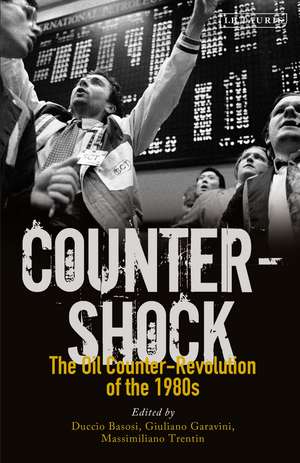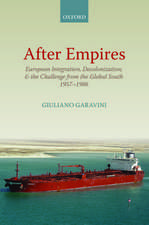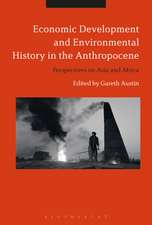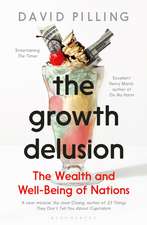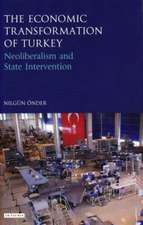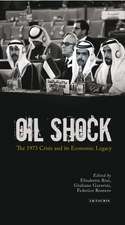Counter-shock: The Oil Counter-Revolution of the 1980s
Editat de Duccio Basosi, Giuliano Garavini, Massimiliano Trentinen Limba Engleză Paperback – 30 oct 2019
| Toate formatele și edițiile | Preț | Express |
|---|---|---|
| Paperback (1) | 233.17 lei 6-8 săpt. | |
| Bloomsbury Publishing – 30 oct 2019 | 233.17 lei 6-8 săpt. | |
| Hardback (1) | 717.37 lei 6-8 săpt. | |
| Bloomsbury Publishing – 29 apr 2018 | 717.37 lei 6-8 săpt. |
Preț: 233.17 lei
Preț vechi: 298.32 lei
-22% Nou
Puncte Express: 350
Preț estimativ în valută:
44.62€ • 46.53$ • 37.09£
44.62€ • 46.53$ • 37.09£
Carte tipărită la comandă
Livrare economică 20 martie-03 aprilie
Preluare comenzi: 021 569.72.76
Specificații
ISBN-13: 9781838605827
ISBN-10: 1838605827
Pagini: 400
Ilustrații: 21 bw integrated
Dimensiuni: 138 x 216 x 25 mm
Greutate: 0.46 kg
Editura: Bloomsbury Publishing
Colecția I.B.Tauris
Locul publicării:London, United Kingdom
ISBN-10: 1838605827
Pagini: 400
Ilustrații: 21 bw integrated
Dimensiuni: 138 x 216 x 25 mm
Greutate: 0.46 kg
Editura: Bloomsbury Publishing
Colecția I.B.Tauris
Locul publicării:London, United Kingdom
Notă biografică
Duccio Basosi is Assistant Professor of History of International Relations at the Ca' Foscari University of Venice. He has worked extensively on the international political economy of the 1970s and 1980s. Between 2011 and 2016 he has coordinated the research project The Engines of Growth: A Global History of the Conflict between Renewables, Fossil and Fissile Energies 1972-1992, funded by the Italian Ministry of University and Research. Giuliano Garavini is Senior Braudel Fellow at the European University Institute (EUI) in Florence and Visiting Senior Research Fellow in the Humanities at NYU Abu Dhabi. He headed the Padua unit of the project `The engines of growth: for a global history of the conflict between renewable, fossil, and fissile energies, 1972-1992', funded by the Italian Ministry of University and Research. He is the author of After Empires. European Integration, Decolonization and the Challenge from the Global South, 1957-1986 and co-editor of Oil Shock. The 1973 Crisis and its Economic Legacy.Massimiliano Trentin is Assistant Professor of History and International relations of the Middle East at the Department of Political and Social Sciences, University of Bologna. He works on the International History of the Middle East and North Africa, with a special focus on the interplay between diplomacy, economics and development. He is the author of Engineers of Modern Development: East German Experts in Ba'thist Syria, 1965-1972, and editor of The Middle East and the Cold War: Between Security and Development. He is the Principal Investigator of the PRIN National Research Grant from the Italian Ministry of Scientific Research for the project The Making of the Washington Consensus: International Assets, Debts and Power 1979-1991.
Cuprins
List of IllustrationsList of ContributorsIntroduction: Counter-shock and counter-revolution by Duccio Basosi, Giuliano Garavini and Massimiliano TrentinPART I: OIL PRICES IN CONTEXT1. Price regimes, price series and price trends: oil shocks and counter-shocks in historical perspective by Giovanni Favero and Angela Faloppa2. The role of the dollar and the justificatory discourse of neoliberalism by David E. Spiro3. The oil market and global finance in the 1980s by Catherine R. Schenk4. Counter-shocked? The oil majors and the price slump of the 1980s by Francesco PetriniPART II: THE PRODUCERS: OPEC5. Saudi Arabia and the counter-shock of 1986 by Majid Al-Moneef6. Iran and the counter-shock: oil as a weapon (for survival) by Claudia Castiglioni7. Iraq, Saudi Arabia, and the counter-shock by Ibrahim Al-MarashiPART III: THE PRODUCERS: NON-OPEC8. Abandoning enforced autarky for re-insertion in the world petroleum market: Mexican oil policy, 1976-86 by Juan Carlos Boué9. The double shock: the Soviet energy crisis and the oil price collapse of 1986 by Olga Skorokhodova10. The counter-shock in Norwegian oil history by Einar Lie and Dag Harald Claes11. Counter-shock or after-shock? North Sea oil and economics as politics in the UK, 1973-86 by Martin ChickPART IV: THE CONSUMERS12. Reducing dependence on OPEC-oil. The IEA's energy strategy between 1976 and the mid-1980s by Henning Türk13. The United States and the oil price collapse of the 1980s by Victor McFarland14. Back to the future: changes in energy cultures and patterns of consumption in the United States, 1973-86 by Elisabetta BiniPART V: ENERGY AND ENVIRONMENTAL CHALLENGES15. The rise of environmentalist movements and the debate on alternative sources of energy during the oil crisis in the United States by Angela Santese16. The role of nuclear reactor technology on the development of the nuclear industry and decision making in the context of the price fluctuations of the 1970s and 1980s by Duncan Connors and Eshref Trushin17. A small window. The opportunities for renewable energies from shock to counter-shock by Duccio BasosiNotesBibliographyIndex
Recenzii
The wide variety of perspectives adopted makes this volume complex and opens up important areas of future research ... A work that straddles economic history, political history and more specifically international relations, which illuminates in particular a significant historical junction to which contemporary history has not paid sufficient attention.
An important book, thoroughly crafted/planned by its editors [and] co-written by 20 contributors, mostly foreign and Italian academics.
An important book, thoroughly crafted/planned by its editors [and] co-written by 20 contributors, mostly foreign and Italian academics.
